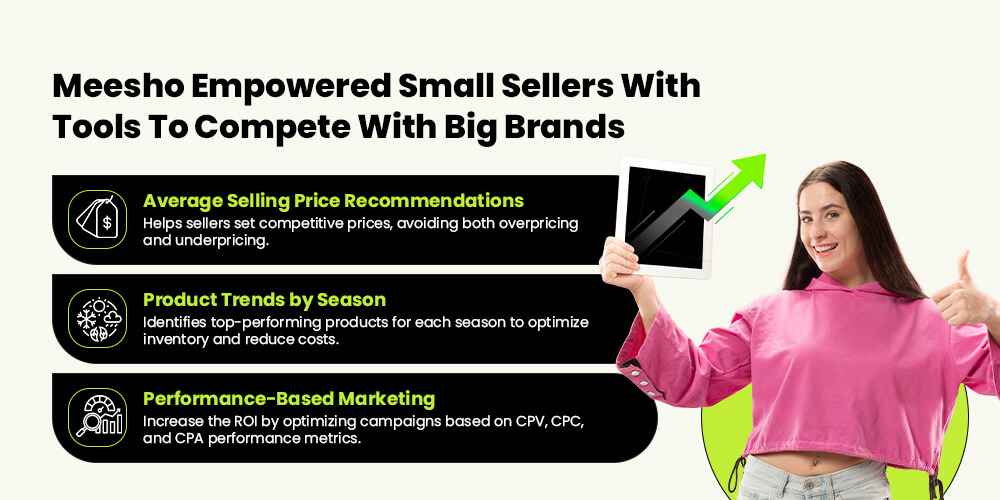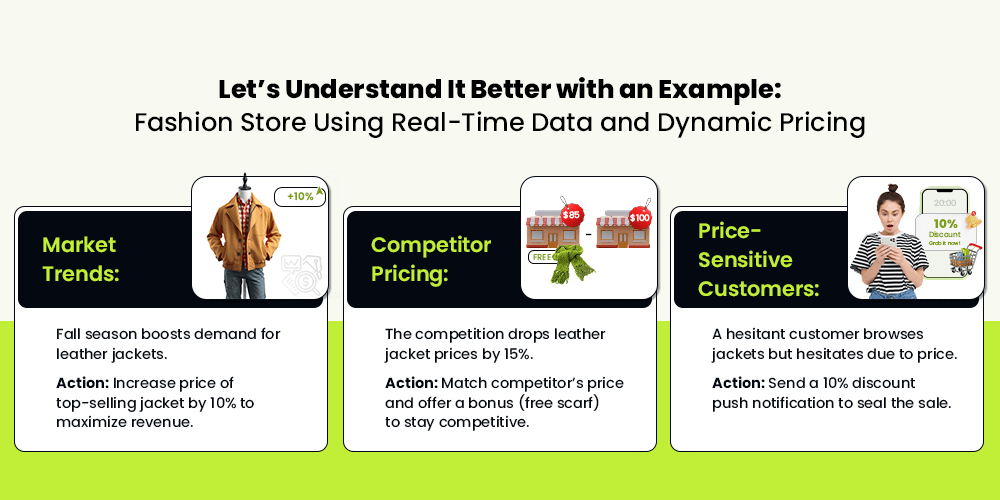You’ve spent time, effort, and money to attract a new customer and enhance customer retention of your Shopify store. They make a purchase, and you’re thrilled. But then they never come back. Frustrating, right? Now, what if that same customer returned again and again, spending more each time? That’s the power of customer retention.
Data-driven insights have proven to help retailers to boost customer retention by 10-15%
Meesho: Empowering Small Sellers With Smart Recommendations
Meesho’s rise as a favorite platform for online merchants in India, outpacing giants like Amazon and Flipkart, is due to its focus on empowering small vendors. With smart recommendations and data-driven insights.

Average Selling Price Recommendations:
Meesho analyzes the pricing data across similar products and suggests the average selling price (ASP) for a seller’s products. This ensures that sellers remain competitive without overpricing or underpricing, which is especially valuable for small vendors who may not have the resources to track competitors manually and enhance customer retention.
Product Trends During Different Seasons:
This allows vendors to plan their inventory in advance, stock up on in-demand products, and adjust their sales strategies to meet market demand, ultimately enhancing customer retention.
Performance-Based Marketing (CPV, CPC, CPA):
Meesho provides actionable marketing insights through performance metrics like Cost Per View (CPV), Cost Per Click (CPC), and Cost Per Acquisition (CPA). These metrics help sellers optimize their marketing campaigns, ensuring they get the best return on investment by focusing on ads that are performing well and making data-driven decisions.
What Are Key Data Analytics Tools for Smart Recommendations
Smart recommendations rely heavily on data to deliver personalized, relevant suggestions to customers, which in turn drives higher engagement and sales.
Personalization Through Customer Data
By analyzing customer data like purchase history, browsing behavior, and demographic data, merchants can recommend relevant products to boost sales.
- Purchase History: Suggest frequently bought items or complementary products based on past purchases. For example, if a customer buys a fitness tracker, recommend related accessories like smartwatches.
- Browsing Behavior: Analyze products customers viewed but didn’t buy. Send custom push notifications to encourage purchases, like offering a discount on items left in the cart.
- Demographic Data: Tailor recommendations based on age, gender, and interests. For instance, recommend beauty products based on a customer’s age group and preferences.
Real-Time Data and Dynamic Pricing
Real-time data allows merchants to adjust prices based on market trends, competitor pricing, and demand, helping them stay competitive.
- Market Trends: Adjust prices based on demand, ensuring maximum revenue during high-demand periods.
- Competitor Pricing: Monitor competitors and adjust pricing to stay competitive. If a competitor lowers their price, merchants can match or undercut to attract price-sensitive customers.
- Price-Sensitive Customers: Offer timely discounts and competitive pricing to retain customers looking for the best deals, without sacrificing profitability.

Benefits of Smart Recommendations for Keeping Customers Coming Back
Getting customers to visit your store is exciting, but turning them into repeat buyers? That’s the real game changer. With smart recommendations, you’re not just selling, you’re building relationships.
That’s the magic of smart recommendations. They keep your customers hooked, build loyalty, and ultimately grow your business.
- Deliver Personalized Experiences: Tailor product suggestions based on browsing history and preferences to enhance customer satisfaction. Example: A beauty store recommends skincare products based on a customer’s previous purchases and skin type. If they bought a moisturizer for dry skin, the store suggests a hydrating serum to enhance their routine.
- Showcase Relevant Products: Boost conversion rates by recommending items that match each customer’s unique needs. Example: An electronics store tracks a customer’s browsing behavior and suggests a laptop case and wireless mouse right after they add a laptop to their cart, increasing the chances of a bundle purchase.
- Build Loyalty with Tailored Value: A beauty store recommends skincare products based on a customer’s previous purchases and skin type. If they bought a moisturizer for dry skin, the store suggests a hydrating serum to enhance their routine. Encourage repeat purchases by consistently offering relevant, value-driven recommendations. Example: A fashion retailer offers a 10% discount on new arrivals to loyal customers who frequently buy during the spring season, making them feel valued and encouraging repeat purchases.
How Small Sellers Can Compete with eCommerce Giants Using Data
Competing with big players like Amazon can feel overwhelming, but here’s the good news. Data-driven strategies are your secret weapon. With the right insights, online merchants can compete effectively and stand out against the big players of the game.
Let’s dive into how to implement it.
Optimize Logistics to Lower Fulfillment Costs
Instead of focusing on super-fast delivery like Amazon, small sellers can use data to streamline their logistics and reduce fulfillment costs. Meesho’s logistics rate of just 10-15% is a game-changer, helping sellers keep costs low while delivering efficiently. It’s a smart way to boost profits without sacrificing speed or service.
Example: Use sales data to identify high-demand regions and partner with local couriers for affordable, reliable shipping.
Maintain Healthy Cash Flow with Shorter Payment Cycles
Cash flow is the lifeblood of any small business. Unlike giants that can afford long payment cycles, small sellers benefit from faster payouts. Meesho’s 7-day payment cycle allows sellers to quickly reinvest in stock, manage inventory, and keep operations running smoothly.
Example: Use payment cycle data to plan inventory restocking strategically, ensuring popular items are always available during peak demand periods.
Relevant data is the secret weapon for small sellers to compete with the giants and thrive in the eCommerce world. Let’s learn how to use MageNative App Builder app analytics like most viewed, sold, wishlisted products, and most searched keywords to boost your sales.
In a Nutshell – Smart Recommendations: A Game-Changer for Boosting Customer Retention and Loyalty
Data-driven insights and smart recommendations can increase customer retention by up to 40% and boost conversion rates by 20%. Personalized product suggestions alone account for 35% of Amazon’s revenue, showcasing the power of tailored experiences.
To compete effectively in the eCommerce space, merchants must adopt these strategies. Leverage customer behavior data, optimize product offerings, and build loyalty to drive repeat purchases and sustainable growth. Stay ahead, retain more customers, and watch your business thrive
About The Author
I love navigating the world of SaaS with finesse. As an SEO enthusiast and seasoned Copy Writer, I'm here to transform tech-speak into compelling narratives that resonate with online merchants. With a penchant for alliteration and a touch of humor, I bring a unique flair to SaaS content.
Related Posts
Mobile App Analytics: Proven Techniques, Real Examples, and Key Metrics Every Merchant Should Track
Building a mobile app is just the beginning of the…
Personalized Customer Loyalty Programs Are Your Best Bet To Drive Consistent Revenue Growth
Customer loyalty programs are no longer optional if you want…
MageNative Single Page Checkout — Win Customers in Just One Tap
Did you know – 69% of online shoppers abandon their…